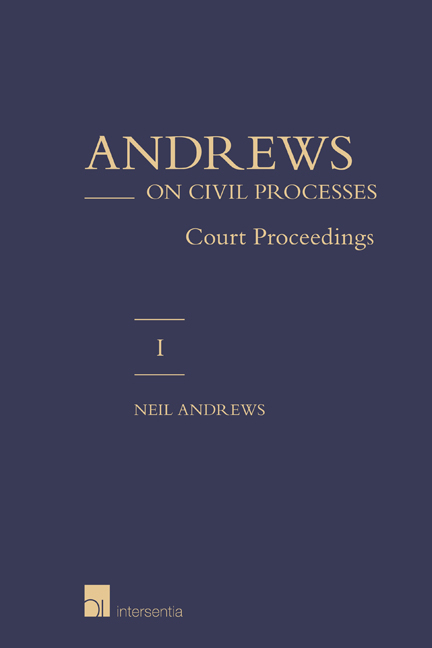Book contents
- Frontmatter
- Dedication
- Epigraph
- Preface
- Contents
- Table of Cases
- Table of Statutes
- Table of Statutory Instruments
- PART I INTRODUCTION TO THE FORMS OF CIVIL JUSTICE
- PART II COMMENCEMENT OF COURT PROCEEDINGS AND PREPARATION FOR TRIAL
- PART III END-GAME: TRIAL, APPEAL, FINALITY AND ENFORCEMENT
- PART IV COSTS AND FINANCING OF LITIGATION
- PART V SPECIAL PROCEEDINGS
- Chapter 21 Protective Relief
- Chapter 22 Multi-Party Litigation
- Chapter 23 Complex Litigation
- Chapter 24 The Commercial Court
- PART VI PRINCIPLES OF CIVIL LITIGATION
- PART VII THE EUROPEAN CONTEXT
- Select Bibliography
- Index to Volumes I and II
Chapter 22 - Multi-Party Litigation
from PART V - SPECIAL PROCEEDINGS
Published online by Cambridge University Press: 13 December 2017
- Frontmatter
- Dedication
- Epigraph
- Preface
- Contents
- Table of Cases
- Table of Statutes
- Table of Statutory Instruments
- PART I INTRODUCTION TO THE FORMS OF CIVIL JUSTICE
- PART II COMMENCEMENT OF COURT PROCEEDINGS AND PREPARATION FOR TRIAL
- PART III END-GAME: TRIAL, APPEAL, FINALITY AND ENFORCEMENT
- PART IV COSTS AND FINANCING OF LITIGATION
- PART V SPECIAL PROCEEDINGS
- Chapter 21 Protective Relief
- Chapter 22 Multi-Party Litigation
- Chapter 23 Complex Litigation
- Chapter 24 The Commercial Court
- PART VI PRINCIPLES OF CIVIL LITIGATION
- PART VII THE EUROPEAN CONTEXT
- Select Bibliography
- Index to Volumes I and II
Summary
FOUR FORMS OF ENGLISH MULTI-PARTY LITIGATION
English ‘multi-party’ litigation can take one of four forms: (i) test case litigation, supported by the staying of related individual actions; (ii) consolidated litigation or joinder, so that claims are coupled together into a single but long snake of a case; (iii) representative proceedings; and (iv) numerous claims under a Group Litigation Order (GLO). (On use of alternative dispute resolution, notably in the field of consumer grievances, see 21.01 ff, vol II; and for comparative discussion on collective actions, see the Buenos Aires (2012) conference papers). The (then Labour) Government in July 2009 opposed introduction of a generic opt-out class action in England for compensatory claims, etc. This rejection is explained more fully at 22.70 ff below. The scheme of this chapter is as follows: after brief explanations of (i) and (ii), detailed discussion will turn to (iii) and (iv).
TEST CASE WITH STAY OF RELATED CASES
Large numbers of related claims might be stayed pending the outcome of a test case to be decided by the High Court. An example is the bank charges litigation, culminating in the Supreme Court's decision in Office of Fair Trading v. Abbey National plc (2009), which concerned alleged over-charging of current account customers who exceed their credit limits. Nearly all citizens have a pecuniary interest in this issue. In this test case a governmental agency responsible for consumer protection and regulation of trading practices, invoked its statutory powers to seek a judicial declaration. The huge financial importance of the issue, and the banks’ determination to defeat the challenge to their charges, led to successive appeals from the High Court to the Court of Appeal and the Supreme Court on a pure point of law. It was hoped (although this hope proved to be misplaced) that this declaration would provide the legal basis for a vast number of bank customers to obtain relief in respect of alleged over-charging on their bank accounts. But the test case failed when the Supreme Court held that the alleged over-charging could not be struck down under the relevant contractual regulations. This was because the contractual conditions fell within prohibited zone of contractual freedom, as defined by the relevant legislation.
- Type
- Chapter
- Information
- Andrews on Civil ProcessesCourt Proceedings, pp. 619 - 658Publisher: IntersentiaPrint publication year: 2013



